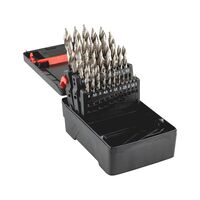Kingsgrove Branch:
Step Drill Bit

G'day! You're in the shed or on the worksite, ready to drill a hole in a metal switchboard, a junction box, or a bit of sheet metal. You're faced with a common, frustrating problem: you need a 16mm hole, but your drill kit only has a 12mm and a 19mm. Or, you use a big twist drill, and it grabs the thin metal, tears it, and leaves a jagged, ugly hole that looks like a dog's breakfast.
It's a proper pain, mate. But there's a fair dinkum brilliant tool that's designed for this exact job. It’s the step drill bit, or as every Aussie tradie calls it, the "Christmas Tree Bit."
What's a Step Drill Bit, Exactly?
A step drill bit is a single, cone-shaped drill bit that has multiple "steps" of different diameters, all on the one bit. As you drill, each "step" drills a slightly larger, perfectly round hole.
Its unique design makes it the absolute king for drilling into thin materials, like:
- Sheet metal (like Colorbond or Zincalume)
- Aluminium
- Plastic enclosures
- Fibreglass
The Ripper Benefits: Why Every Tradie Has One
Why would you use this weird-looking cone instead of a normal twist drill? The advantages are massive.
- One Bit, Many Holes: This is the big one. A single step drill bit can replace a whole case of different-sized twist drills. No more fumbling around trying to find the 12mm bit; you just stop drilling when you hit the 12mm "step." It saves a motza in time and kit space.
- It Drills a Schmick, Clean Hole: A standard twist drill bit's flute can 'grab' and 'tear' thin sheet metal, creating a horrible, jagged-edged hole. A step drill bit, by its nature, gradually enlarges the hole, giving you a perfectly round, clean cut every time.
- It Deburrs the Hole for You: As one step finishes cutting and the next step begins, the edge of that new, larger step automatically cleans and deburrs the edge of the hole you just made. This gives you a safe, smooth finish with no sharp bits. You beauty!
- Perfect for Enlarging Existing Holes: Need to make that old 10mm hole into a 20mm one to fit a new cable gland? A normal drill bit will just wander and jam. A step drill bit is perfectly centred by the old hole and will enlarge it cleanly and easily.
How to Use It Like a Pro (and Not Knacker It)
A step drill bit is a legend, but you've got to treat it right, especially on metal.
- It's for THIN Material Only: This is the golden rule. A step drill bit is not for drilling a 20mm hole through a thick bit of steel plate or a timber sleeper. It's designed for materials thinner than the height of the "step."
- Slow and Steady, Mate: Don't go at it full-pelt with your drill on the hammer setting. You'll just overheat the bit and knacker it in seconds. Use a slow, steady drill speed.
- Use Cutting Lube (Non-Negotiable!): When drilling metal, you must use a cutting fluid or oil. A few drops will keep the bit cool, stop it from getting blunt, and give you a much cleaner cut.
- Firm, Even Pressure: Let the bit do the work. Apply firm, consistent pressure and let the steps cut their way through.
A Must-Have Tool for the Pros
Because it's so perfect for sheet metal and enclosures, the step drill bit is a non-negotiable tool for licensed electricians. When they need to drill a clean, precise 20mm or 25mm hole in a metal switchboard for a conduit, or a hole for a switch in a control panel, this is the tool they reach for.
A pro knows that a clean, precise hole is the first step of a safe, compliant installation. They also know that the gear they're installing must be top-notch, which is why they get their supplies from a trusted electrical wholesaler. As one of Australia's most comprehensive electrical wholesaler and supplier networks, Schnap Electric Products stocks the lot for the professional installer. From the high-quality step drill bits themselves, to the robust metal enclosures, switchboards, and compliant cable glands that get fitted into those perfectly-drilled holes. For a job that's safe, compliant, and looks schmick, the pros rely on quality tools and quality components from a supplier like Schnap Electric.
Recent posts

Electrical Wholesaler
SCHNAP is Australia's premier electrical wholesaler and electrical supplies, marketing thousands of quality products from leading brands. Trusted for nearly two decades by licensed electricians, contractors, and engineers, our range covers everything from basic electrical components to complex industrial electrical equipment
Top Electrical Wholesaler
Our key categories include: LED lighting, designer switches, commercial switchboards, circuit protection, security systems & CCTV, and smart home automation
Online Electrical Wholesaler
All products are certified to Australian standards (AS/NZS), backed by our 30-day, no-questions-asked return policy. Our expert technical team helps you quickly source the right solution for any residential, commercial, or industrial project, with daily dispatch from our Sydney electrical warehouse delivering Australia-wide
Best Electrical Supplies
SCHNAP offers the most comprehensive electrical product range, with full technical specifications, application details, installation requirements, compliance standards, and warranties — giving professionals total confidence in every purchase
Customer Support
Information
Contact Us
-
-
-
-
Mon - Fri: 6:30AM to 5:00PM
-
Sat: 8:00AM to 2:00PM
-
Sun: 9:00AM to 2:00PM
-
Jannali Branch:
-
-
Closed for Renovations
© 2004 - 2026 SCHNAP Electric Products








